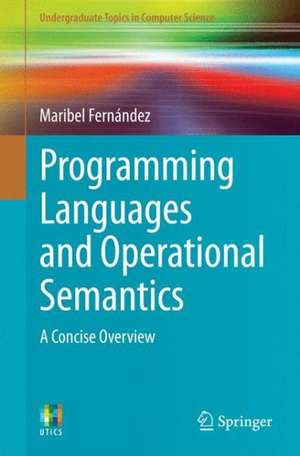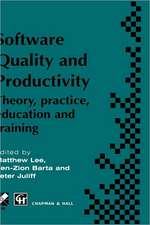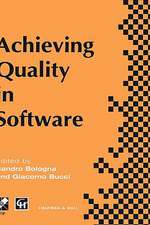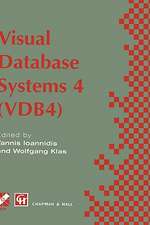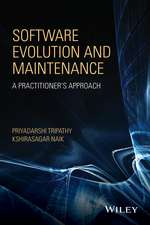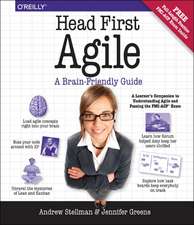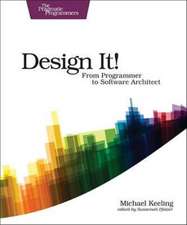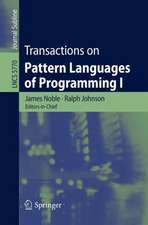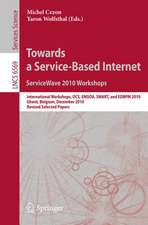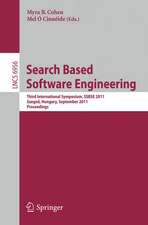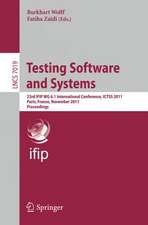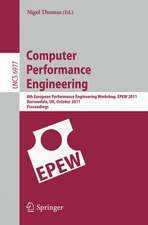Programming Languages and Operational Semantics: A Concise Overview: Undergraduate Topics in Computer Science
Autor Maribel Fernándezen Limba Engleză Paperback – 19 mar 2014
Din seria Undergraduate Topics in Computer Science
- 20%
 Preț: 272.43 lei
Preț: 272.43 lei - 20%
 Preț: 233.75 lei
Preț: 233.75 lei - 20%
 Preț: 318.97 lei
Preț: 318.97 lei - 20%
 Preț: 306.58 lei
Preț: 306.58 lei - 20%
 Preț: 187.22 lei
Preț: 187.22 lei - 20%
 Preț: 316.24 lei
Preț: 316.24 lei - 20%
 Preț: 280.92 lei
Preț: 280.92 lei - 20%
 Preț: 287.02 lei
Preț: 287.02 lei - 20%
 Preț: 305.61 lei
Preț: 305.61 lei - 20%
 Preț: 258.78 lei
Preț: 258.78 lei - 20%
 Preț: 304.36 lei
Preț: 304.36 lei - 20%
 Preț: 246.39 lei
Preț: 246.39 lei -
 Preț: 334.88 lei
Preț: 334.88 lei - 20%
 Preț: 316.07 lei
Preț: 316.07 lei - 20%
 Preț: 336.99 lei
Preț: 336.99 lei - 20%
 Preț: 245.43 lei
Preț: 245.43 lei - 20%
 Preț: 306.71 lei
Preț: 306.71 lei - 20%
 Preț: 350.89 lei
Preț: 350.89 lei - 20%
 Preț: 384.11 lei
Preț: 384.11 lei - 20%
 Preț: 374.37 lei
Preț: 374.37 lei - 20%
 Preț: 225.02 lei
Preț: 225.02 lei - 20%
 Preț: 226.64 lei
Preț: 226.64 lei - 20%
 Preț: 375.53 lei
Preț: 375.53 lei - 20%
 Preț: 395.04 lei
Preț: 395.04 lei - 20%
 Preț: 307.16 lei
Preț: 307.16 lei - 20%
 Preț: 179.87 lei
Preț: 179.87 lei - 20%
 Preț: 254.37 lei
Preț: 254.37 lei - 20%
 Preț: 371.61 lei
Preț: 371.61 lei - 20%
 Preț: 227.15 lei
Preț: 227.15 lei - 20%
 Preț: 192.73 lei
Preț: 192.73 lei - 20%
 Preț: 342.45 lei
Preț: 342.45 lei - 20%
 Preț: 276.82 lei
Preț: 276.82 lei - 20%
 Preț: 237.35 lei
Preț: 237.35 lei - 20%
 Preț: 374.20 lei
Preț: 374.20 lei - 20%
 Preț: 304.44 lei
Preț: 304.44 lei - 20%
 Preț: 297.28 lei
Preț: 297.28 lei - 20%
 Preț: 579.37 lei
Preț: 579.37 lei - 20%
 Preț: 298.18 lei
Preț: 298.18 lei - 20%
 Preț: 243.35 lei
Preț: 243.35 lei - 20%
 Preț: 302.80 lei
Preț: 302.80 lei - 20%
 Preț: 297.66 lei
Preț: 297.66 lei - 20%
 Preț: 300.89 lei
Preț: 300.89 lei - 20%
 Preț: 191.35 lei
Preț: 191.35 lei - 20%
 Preț: 278.10 lei
Preț: 278.10 lei - 20%
 Preț: 304.21 lei
Preț: 304.21 lei - 20%
 Preț: 389.96 lei
Preț: 389.96 lei - 20%
 Preț: 429.00 lei
Preț: 429.00 lei - 20%
 Preț: 281.40 lei
Preț: 281.40 lei
Preț: 412.44 lei
Preț vechi: 515.55 lei
-20% Nou
Puncte Express: 619
Preț estimativ în valută:
78.93€ • 81.54$ • 65.69£
78.93€ • 81.54$ • 65.69£
Carte tipărită la comandă
Livrare economică 26 martie-09 aprilie
Preluare comenzi: 021 569.72.76
Specificații
ISBN-13: 9781447163671
ISBN-10: 1447163672
Pagini: 209
Ilustrații: IX, 209 p. 10 illus.
Dimensiuni: 155 x 235 x 20 mm
Greutate: 3.4 kg
Ediția:2014
Editura: SPRINGER LONDON
Colecția Springer
Seria Undergraduate Topics in Computer Science
Locul publicării:London, United Kingdom
ISBN-10: 1447163672
Pagini: 209
Ilustrații: IX, 209 p. 10 illus.
Dimensiuni: 155 x 235 x 20 mm
Greutate: 3.4 kg
Ediția:2014
Editura: SPRINGER LONDON
Colecția Springer
Seria Undergraduate Topics in Computer Science
Locul publicării:London, United Kingdom
Public țintă
Lower undergraduateCuprins
Introduction.- Mathematical Background.- General Features of Imperative Languages.- Operational Semantics of Imperative Languages.- General Features of Functional Languages.- Operational Semantics of Functional Languages.- General Features of Logic Programming Languages.- Operational Semantics of Prolog.- Answers to Selected Exercises.
Recenzii
From the book reviews:
“This text can serve as a complement to traditional undergraduate programming language course resources or as the main textbook for introductory courses in programming language operational semantics. The book is well organized, flows well, and is pleasant to read. … Summing Up: Recommended. Upper-division undergraduates and faculty.” (D. Papamichail, Choice, Vol. 52 (5), January, 2015)
“There are many things in this book that would lead to its recommendation as a course textbook: it provides a good breadth of material, and a stepping stone from programming experience to more theoretical aspects of programming languages. … it would be an excellent addition to a reference list that could be used to inform a solid understanding of programming language theory.” (Sara Kalvala, Computing Reviews, July, 2014)
“This text can serve as a complement to traditional undergraduate programming language course resources or as the main textbook for introductory courses in programming language operational semantics. The book is well organized, flows well, and is pleasant to read. … Summing Up: Recommended. Upper-division undergraduates and faculty.” (D. Papamichail, Choice, Vol. 52 (5), January, 2015)
“There are many things in this book that would lead to its recommendation as a course textbook: it provides a good breadth of material, and a stepping stone from programming experience to more theoretical aspects of programming languages. … it would be an excellent addition to a reference list that could be used to inform a solid understanding of programming language theory.” (Sara Kalvala, Computing Reviews, July, 2014)
Textul de pe ultima copertă
Providing a concise introduction to the essential concepts in programming languages, using techniques from operational semantics, this book highlights three major programming paradigms:
• Imperative languages: the main features of these languages are illustrated with examples in Java, Python, C;
• Functional languages: modern languages such as ML and Haskell are used to describe the functional style of programming;
• Logic languages: the last part of the book gives an overview of logic programming using Prolog.
Following a general description of each family of languages, their semantics are studied using abstract machines and structural operational semantics. Programming Languages and Operational Semantics gives an in-depth analysis of the basic concepts in programming languages instead of a mere survey of languages, assisting the understanding of the fundamental notions in programming languages over simply describing their properties.
It isaddressed to undergraduate students, as a complement to programming courses.
• Imperative languages: the main features of these languages are illustrated with examples in Java, Python, C;
• Functional languages: modern languages such as ML and Haskell are used to describe the functional style of programming;
• Logic languages: the last part of the book gives an overview of logic programming using Prolog.
Following a general description of each family of languages, their semantics are studied using abstract machines and structural operational semantics. Programming Languages and Operational Semantics gives an in-depth analysis of the basic concepts in programming languages instead of a mere survey of languages, assisting the understanding of the fundamental notions in programming languages over simply describing their properties.
It isaddressed to undergraduate students, as a complement to programming courses.
Caracteristici
Provides the foundations and tools needed to design new programming languages and understand existing ones Explains in a concise way the most significant constructs of modern imperative, functional and logic programming languages Each chapter contains exercises that provide an opportunity to apply the concepts and techniques presented Includes supplementary material: sn.pub/extras
